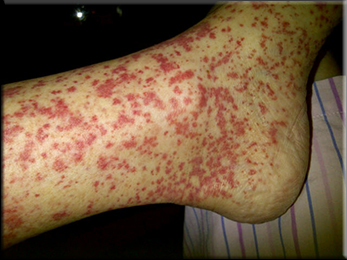Leukocytoclastic Vasculitis (LCV)

Introduction
Vasculitis is defined as an inflammation of the blood vessels, this inflammation may present inside or may surround the blood vessels whereas Leukocytoclastic vasculitis (LCV) is an inflammatory condition of the blood vessels particularly the small ones which are characterized by palpable purpura (red and purple discolored spots on the skin).
Basically, leucocytes are the culprit that give rise to this condition. Leucocytes are the types of white blood cells that counteract the action of antigens in our body. There are various types of leucocytes in our body but in this condition mainly neutrophils are involved as they cause damage to the blood vessels and to the surroundings by nuclear debris. The signs and symptoms of this disease represent the involvement of various systems in our body like – muscular-skeletal system, genitourinary, etc. Thus, these purpuras can develop at any part of the body.
The incidence ratio of this disease is higher in adults as compared to youngsters and it equally affects males and females. This condition may resolve within a few weeks to months in many individuals.
This condition is also known as cutaneous small vessel vasculitis (CSVV) and Hypersensitivity vasculitis.
According to Ayurveda, this condition is classified as a "Pittaja Nanatamaja Vyadhi" which doesn't occur unless or until Pitta dosha in our body gets vitiated. This pitta dosha directly affects our rasa and rakta dhatu and even gets localized in the blood and revolves around the body and produces signs and symptoms like - tawak vaivarnata (discoloration of skin), ruja (pain), daha (burning sensation), etc.
What are the Causes of Leukocytoclastic Vasculitis (LCV)?
The exact cause of the disease is still unknown but there are some exaggerated factors, they are :-
- History of bacterial and viral infections
- Certain medications like - corticosteroids, beta-blockers, etc.
- Autoimmune disorders like - Rheumatoid arthritis, psoriasis, etc.
- Family history of Leukocytoclastic Vasculitis.
- Our improper diet and lifestyle is also a major cause for the origin of this disease.
- Weak immunity.
What are the Signs and Symptoms of Leukocytoclastic Vasculitis?
As we discussed this condition can affect the small blood vessels of any part of the body so the signs and symptoms also vary from person to person due to the underlying involved system. But there are some common signs and symptoms. These are :-
- Skin is the main involved part that represents symptoms like - Discoloration of skin and blisters.
- Palpable purpura which is red to purple in color.
- Eruptions like - Papules and pustule (pus-filled) formation.
- Redness
- Burning sensation
- Localized pain
- Malaise
- Mild fever
- Muscle pain
- Joint pain
The location of these blisters varies but the most common site is waist, buttocks and legs.
Even after complete cure, there is some impact over skin which appears as hyperpigmented.
Diagnosis
Diagnosis of the disease can be made through laboratory investigations such as :-
- CBC (Complete blood count)
- LFT (Liver function test)
- ESR (Erythrocyte sedimentation rate)
- Immunoglobulin assay
- Biopsy
- CT scan and MRI
Management
The management strategy of Leukocytoclastic Vasculitis (LCV)as per Ayurveda goes as :-
- Management of the immune system by Rasayana therapy.
- Pacifying vitiated Pitta and rakta dosha in our body.
- Detoxification of the body
- Improving Agni
- Lifestyle and dietary management
Treatment aspect as per Ayurveda
Ayurveda deals with this disease with its both the therapies Shamana and Shodhana. Shodhana therapy helps to eliminate the toxins from the body and minimizes the chance of reoccurrence.
In panchakarma the measures are taken to eliminate the toxins from the body even it eliminates vitiated pitta and rakta dosha from the body which leads to the inflammation in the vessels. Among panchakarma virechana, vamana, raktamokshana, jaloka avacharna, abhyanga and basti are beneficial measures to be adopted.
Shamana Chikitsa (Palliative Care) - Rajamruth Vaidyashala offers various herbal formulations that are really effective in the case of Leukocytoclastic vasculitis of the herbs used in this preparation are pure, natural and are chemical free.
Precautions
- Avoid spicy, sour and fermented foodstuffs. Even avoid the use of non-vegetarian, bakery products, and packed foods.
- You can add turmeric, tulsi, coriander, green leafy vegetables, and fresh fruits except citrus fruits in your daily diet.
- Maintain hygiene and perform Yoga on daily basis.

